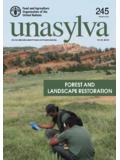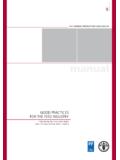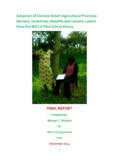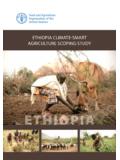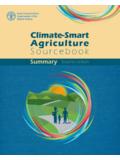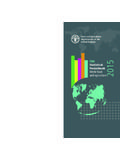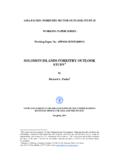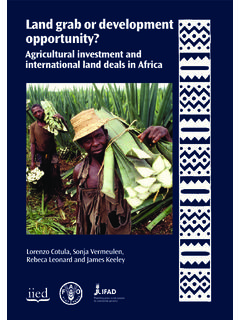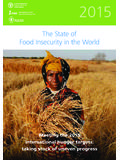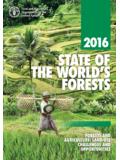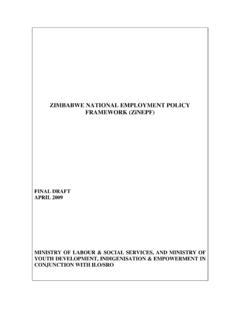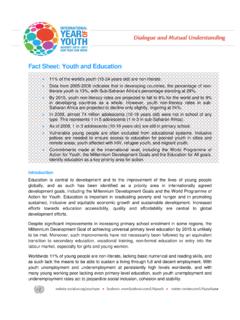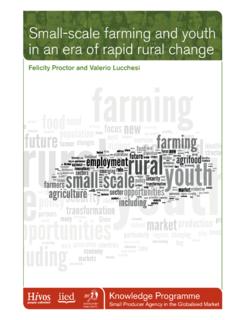Transcription of EXPERT MEETING ADDRESSING THE CHALLENGES FACED ... - …
1 The right season to seed the future EXPERT MEETING . ADDRESSING THE CHALLENGES FACED BY. RURAL youth AGED 15 TO 17 IN PREPARING. FOR AND ACCESSING DECENT WORK. DOCUMENTED RESULTS. Documented results FOOD AND AGRICULTURE ORGANIZATION OF THE UNITED NATIONS. ROME, 2017. The designations employed and the presentation of material in this information product do not imply the expression of any opinion whatsoever on the part of the Food and Agriculture Organization of the United Nations (FAO) concerning the legal or development status of any country, territory, city or area or of its authorities, or concerning the delimitation of its frontiers or boundaries.
2 The mention of specific companies or products of manufacturers, whether or not these have been patented, does not imply that these have been endorsed or recommended by FAO in preference to others of a similar nature that are not mentioned. The views expressed in this information product are those of the author(s) and do not necessarily reflect the views or policies of FAO. FAO, 2017. FAO encourages the use, reproduction and dissemination of material in this information product. Except where otherwise indicated, material may be copied, downloaded and printed for private study, research and teaching purposes, or for use in non-commercial products or services, provided that appropriate acknowledgement of FAO as the source and copyright holder is given and that FAO's endorsement of users' views, products or services is not implied in any way.
3 All requests for translation and adaptation rights, and for resale and other commercial use rights should be made via or addressed to FAO information products are available on the FAO website ( ) and can be purchased through This publication has been printed using selected products and processes so as to ensure minimal environmental impact and to promote sustainable forest management. Cover photo: FAO/Marco Longari Contents abstract iv acknowledgements v Acronyms vi Highlights of discussion 1. working group round 1: preparation for decent employment 1. compulsory education 3. secondary education 4. skills development in rural areas 6.
4 Basic life skills and life risks 10. working group round 2: professional opportunities in agriculture 12. waged work 12. green jobs 14. information communication technology (ict) 15. access to finance 17. access to land 17. access to markets and business development services 18. working group round 3: accessing decent employment 21. access to trade unions and producers organizations 21. access to political participation 22. safe working conditions 23. gender 24. social protection 25. working group round 4: cross cutting themes 27. policy implementation capacity 27. exclusion from youth employment programmes 28. marginalized groups 29.
5 A way forward 32. iii Abstract Rural youth are the future of food security and rural poverty reduction. They are also the present as there are more young people today than ever before billion between the ages of 10 and 24 most of them living in less developed countries and in rural areas. However, youth in rural areas of developing countries face enormous CHALLENGES in preparing for and accessing decent work, including in agriculture. These CHALLENGES are even greater for youth under the age of 18. Considerable work has been undertaken on understanding the CHALLENGES and solutions facing rural youth . However, youth are a heterogenous group, and attention needs to be paid to youth under 18 who have reached the minimum age for employment.
6 This stage in life is typically decisive in how youth will transition from school to work and for the likelihood of transitioning out of poverty. youth under 18 also face specific barriers and vulnerabilities: they can easily succumb to child labour and face additional CHALLENGES in accessing decent employment opportunities, productive resources and services. Facing such barriers, many youth are migrating out of the rural economy. At this stage in development, they are also particularly vulnerable to a number of life risks that can affect their future. This document features the results of the EXPERT MEETING on ADDRESSING the CHALLENGES FACED by Rural youth Aged 15-17 in Preparing for and Accessing Decent Work.
7 The EXPERT MEETING took place from 25 to 28 October, 2016. It contributed to the identification of feasible and effective policies and actions to enable rural youth aged 15-17 to prepare for and access decent work. The agenda was organized around three main phases to reach three overarching objectives: (1) preparation for decent employment through education, skills development and life skills; (2) assessment of decent work opportunities in the rural economy, in particular related to agriculture; and (3) factors that enable youth to access decent work in agriculture and rural areas. The workshop consisted of three working days and was organized in both plenary and parallel working groups.
8 Through 21 working groups, 45 participants from 30 different countries collectively discussed and drafted problem statements and recommendations based on key identified themes. FAO provided secretariat support throughout the MEETING and compiled all problem statements and recommendations, which are presented here as written by participants. The views expressed in this publication do not necessarily reflect the official policy, position or work planning of FAO in this work area. On the other hand, they help to build understanding among practitioners. Examples of countries, projects or initiatives within this publication serve only to illustrate an idea or a proposal.
9 These examples are neither endorsed nor commended by FAO, nor condemned or opposed. iv Acknowledgements The success of the EXPERT MEETING and the documented results have been made possible thanks to the technical contributions of many individuals and organizations. Their valuable inputs are gratefully appreciated. Moreover, distinct acknowledgments go to the Government of France, without whose support this EXPERT MEETING would not have taken place. The preparation of the EXPERT MEETING , the development of its contents and the facilitation were led by the child labour group in the Social Policies and Rural Institutions division (ESP) of FAO: Jacqueline Demeranville, Jessie Rivera-Fagan, Ariane Genthon and Bernd Seiffert.
10 The EXPERT MEETING greatly benefitted from the technical contribution and facilitation skills of Sofie Lambert (ESP. Gender team), Charlotte Goemans (ILO Tanzania) and Giselle Mitton (ITC-ILO). Ms. Mitton was essential in bringing ITC-ILO know-how in terms of capacity development and knowledge exchange throughout the MEETING . Important technical contributions during the EXPERT MEETING were provided by colleagues in FAO headquarters: Brave Ndisale (ESP), Ileana Grandelis (ESP), Peter Wobst (SP3), Zofia Mroczek (ESP), Giulia Calcagnini (ESP), Elisabetta Tagliati (AGP), Emilio Hernandez (ESP), Corina Lefter (ESP), and Janetta Carlucci (ESP).
